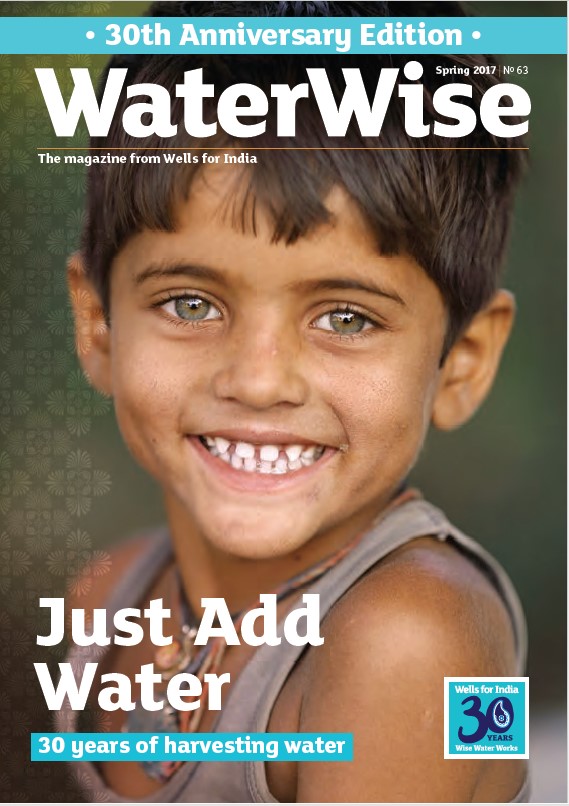As many of my previous IWSN blogposts have conveyed, the UWE team is forging strong links, publishing research and having some impact on water security issues in Rajasthan state, India.
Three papers published to date focus on how promotion of community-based recharge of groundwater from increasingly episodic monsoon rains has regenerated whole socio-ecological systems, both locally and at catchment scale. Have a look at the three published peer-reviewed papers to date, with links to the UWE Repository where you can access ‘full text’ versions of them all:
- Everard, M. (2015). Community-based groundwater and ecosystem restoration in semi-arid north Rajasthan (1): socio-economic progress and lessons for groundwater-dependent areas. Ecosystem Services, 16, pp.125–135. ISSN 2212-0416.
- Everard, M. (2016). Community-based groundwater and ecosystem restoration in semi-arid north Rajasthan (2): reviving cultural meaning and value. Ecosystem Services, 18, pp.33-44. ISSN 2212-0416.
- Davies, T., Everard, M. and Horswell, M. (2016). Community-based groundwater and ecosystem restoration in semi-arid north Rajasthan (3): evidence from remote sensing. Ecosystem Services, 21(A), pp.20-30. ISSN 2212-0416.
The research is kicking on in exciting new directions, with a range of local partners and plenty of as yet unpublished work in the pipeline. Delivery on the ground is crucial if all that work is to have impact, changing minds, policies and ‘real world’ practice.

magazine of Wells for India. (Image © Wells for India)
One of the most exciting developments over the past year has been our deepening relationship with the NGO Wells for India. Wells for India is celebrating its 30th anniversary of great water and sanitation-related works predominantly in the arid and semi-arid state of Rajasthan. The NGO’s mission is “Working with the people of India, we expand the sustainable and efficient provision of safe and secure water to improve the lives and the environment of the poorest rural communities”. Significantly, Wells for India builds its work on the centuries of deep water wisdom that has permeated Rajasthani and Indian culture, enabling people to manage water resources using traditional knowledge and community-scale techniques closely attuned to local geographic and cultural contexts.
The Spring 2017 edition of WaterWise, the Wells for India magazine no.63, will tell you more. It will also tell you a couple of things about the deepening relationship between the IWSN team at UWE and Wells for India. Two news items in particular are that:
- I (Mark Everard) have been invited to become an Ambassador for Wells for India. Given the major successes that the NGO has achieved over 30 years, this is truly a humbling honour, and I will do all I can to add value to that great mission.
- UWE MSc student James Walker has competed in this year’s London Marathon (23 April 2017) to raise funds for Wells for India. In WaterWise, James describes why he opted to be ‘Running for Water’, inspired by the inequality and distribution of wealth he found when visiting India in 2016, and by the talk that Om Prakash Sharma (Country Manager, Wells for India, based in Udaipur, Rajasthan) gave to students and staff when invited to UWE. James’ fundraising page is here.

We have much more work planned with Wells for India as a key delivery partner, including my emerging work on connecting rural, urban and irrigation water demands and wildlife on the Banas River in Rajasthan. The Banas is currently intersected by the Bisalpur Dam, which diverts water 120km northwards out of the catchment to Jaipur City, and to the cities of Ajmer and Tonk as well as a command area of irrigated agricultural land. There is little or no thought of recharge at source or compensatory recharge, nor environmental flow releases downstream of the dam. A narrow focus on mechanised groundwater extraction throughout the catchment and the diversion of huge volumes of the river’s flow without balancing resource recharge is creating vulnerabilities for the whole Banas system and its diverse dependents as water quantity and quality declines. We have argued on the basis of sound evidence elsewhere in Rajasthan that working with communities in the upper catchment to promote recharge practices could make a significant, multi-beneficial difference for all dependents across the entire catchment, and aim to develop impactful research and practical influence to promote this aim.
UWE and Wells for India are also starting to work together on a practical guide, tentatively titled 21 Wise Water solutions in Rajasthan: A guide to their selection, use and maintenance. This document will provide practical guidance to communities, NGOs and government extension workers in identification of which of the many innovative water management solutions found across Rajasthan is likely to deliver the greatest benefits.
The growing relationship between the IWSN/UWE team and Wells for India offers great scope for inspiring, novel and impactful work benefitting water security in Rajasthan and beyond for rural people, dependent cities, riverine ecology and adjacent terrestrial ecosystems.
